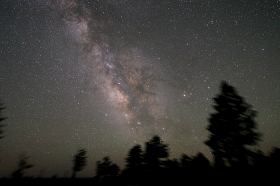Light Pollution Blankets Even the Darkest Skies

Bryce Canyon National Park is known for its unique geology and sprawling landscape. During the Ice Age, glaciers sliced through the red stone leaving behind odd shapes and beautiful scenery. But the park's beauty doesn't disappear once the sun sets, in fact, it lights up.
Ever since 1969, Bryce Canyon has been hosting star programs for public visitors and amateur astronomers. This year, more than 37,000 visitors participated in 100 different star presentations offered at the park.
Dark Ranger Kevin Poe believes recent events in space, such as the shuttle mission to fix the Hubble Space Telescope, have brought more people to the park. Poe also believes visitors are noticing that the stars above aren't shining as bright as they used to.
The sky around the park is exceptionally dark, but it's not the darkest place in the country, it's not even the darkest place in Utah. Still, visitors come to Bryce Canyon to take advantage of the darkness and search for constellations and distant planets.
The practice of looking through a telescope and seeing the Milky Way might become a thing of past due to increase light pollution. That's where Poe and his team of Dark Rangers come in. Their sole purpose is to spread public awareness of the downfalls of light pollution.
"It's evil in the sense that evil is often sneaky, insidious and well disguised. That's the problem of light pollution. People don't have it on their radar as being an environmental problem," Poe said.
The United States' understanding of light and its impact on the environment is somewhat dim. Poe hopes to clear up any misunderstandings about the uses of light, particularly when lights are used to deter crime away from homes.
Patrick Wiggins agrees with Poe. Wiggins, an amateur astronomer and pilot, has provided the park with different space programs for 24 years. He says the public needs to be informed about light pollution.
"Many people, unfortunately, these days walk out their backyard and look up at the sky and they see nothing. Human beings are really smart in many ways, but we're really stupid when it comes to light pollution," Wiggins said.
While light pollution might not take precedence over other environmental concerns, such as air pollution, cities have started to enact city ordinances to control its spread. Chad Moore, leader of the Night Sky Program, says such actions will in turn preserve the night sky.
He also believes the rise in energy costs could play an important role in decreasing light pollution.
"There is an economic incentive to reduce or get rid of light pollution. Sometimes you need less light to see,” Moore said.